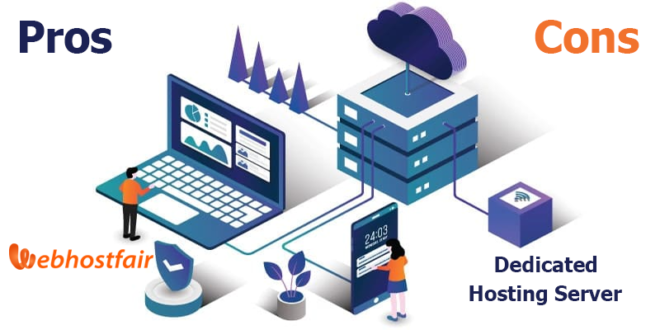A dedicated hosting service is a popular choice for businesses and individuals who require high performance, reliability, and control over their web hosting environment. Unlike shared hosting, where multiple websites share the same server resources, dedicated hosting provides an entire server exclusively for a single client. This setup offers several advantages and some potential drawbacks. In this comprehensive guide, we’ll explore the pros and cons of dedicated hosting services to help you determine if it’s the right choice for your needs.
Pros of Dedicated Hosting Services
- Superior Performance
- Resource Allocation: With dedicated hosting, all server resources, including CPU, RAM, and disk space, are allocated exclusively to your website. This ensures consistent performance, even during peak traffic times.
- High Speed: Dedicated servers typically offer faster load times and better responsiveness compared to shared hosting environments, which can significantly enhance user experience and improve SEO rankings.
- Enhanced Security
- Isolation: Since your website is the only one on the server, the risk of security breaches from neighboring sites is eliminated. This isolation reduces the likelihood of malware infections and hacking attempts.
- Advanced Security Features: Dedicated hosting providers often offer enhanced security features, including firewalls, intrusion detection systems, and regular security audits, helping you maintain a secure hosting environment.
- Full Control and Customization
- Administrative Access: With root or administrative access, you have complete control over the server’s configuration, allowing you to install and configure software, adjust settings, and optimize performance according to your specific requirements.
- Customization: You can tailor the server environment to meet the unique needs of your applications, ensuring compatibility and optimal performance.
- Reliability and Stability
- Consistent Performance: Dedicated hosting eliminates the risk of other websites affecting your server’s performance, providing a stable and reliable hosting environment.
- High Uptime: Many dedicated hosting providers offer high uptime guarantees (often 99.9% or higher), ensuring that your website remains accessible to users around the clock.
- Scalability
- Resource Expansion: dedicated hosting services can be easily upgraded with additional resources as your website grows, providing a scalable solution that can adapt to increasing traffic and data demands.
Cons of Dedicated Hosting Services
- Higher Costs
- Expensive Plans: Dedicated hosting is generally more expensive than shared or VPS hosting due to the exclusive allocation of server resources. This higher cost can be a barrier for small businesses or individuals with limited budgets.
- Additional Expenses: The cost of dedicated hosting can increase further with add-ons such as advanced security features, managed services, and software licenses.
- Technical Expertise Required
- Server Management: Managing a dedicated server requires a certain level of technical expertise, including knowledge of server administration, security, and troubleshooting. Without these skills, you may need to hire a dedicated IT professional or opt for managed hosting services.
- Complex Setup: The initial setup and configuration of a dedicated server can be more complex and time-consuming compared to other hosting options.
- Maintenance and Management
- Responsibility: With dedicated hosting services, you are responsible for maintaining and managing the server, including performing software updates, security patches, and regular backups. This can be time-consuming and requires ongoing attention.
- Downtime Risks: If not managed properly, server downtime can occur due to hardware failures, software issues, or security breaches. This can impact your website’s availability and performance.
- Scalability Challenges
- Resource Allocation: While dedicated servers offer scalability, it often requires more effort and time compared to cloud hosting solutions, where resources can be adjusted dynamically. Upgrading a dedicated server typically involves physical hardware changes and may result in temporary downtime.
- Limited Flexibility
- Fixed Resources: Unlike cloud hosting, which offers flexible resource allocation based on demand, dedicated servers have fixed resources. This means that any resource upgrades or changes require hardware modifications, which can be less flexible and more time-consuming.
Dedicated hosting services offer numerous advantages, including superior performance, enhanced security, full control and customization, reliability, and scalability. These benefits make dedicated hosting an ideal choice for websites with high traffic, resource-intensive applications, and specific security requirements.
However, the higher costs, technical expertise required, maintenance responsibilities, scalability challenges, and limited flexibility are important factors to consider. For businesses or individuals with the necessary budget and technical know-how, dedicated hosting provides an unmatched level of control and performance. For those with limited resources or technical skills, other hosting options like shared, VPS, or managed hosting may be more suitable. Carefully evaluating your specific needs, budget, and technical capabilities will help you determine whether dedicated hosting is the right solution for your web hosting requirements.
 webhostfair Web hosting news, reviews | Best web hosting service for your business
webhostfair Web hosting news, reviews | Best web hosting service for your business

